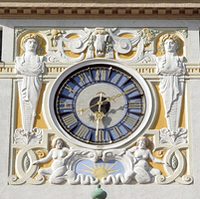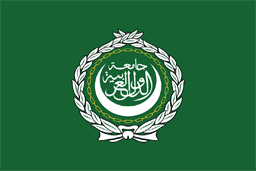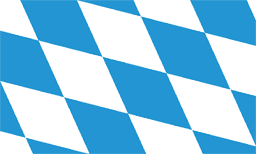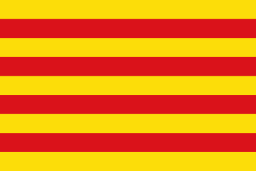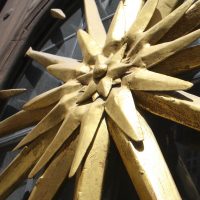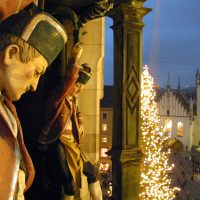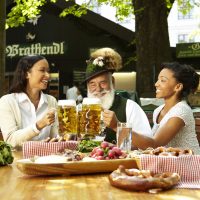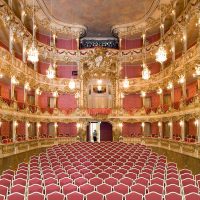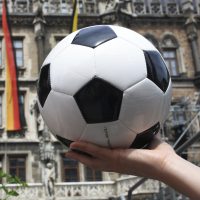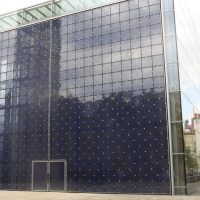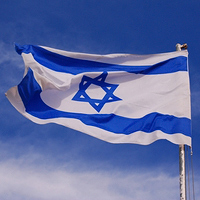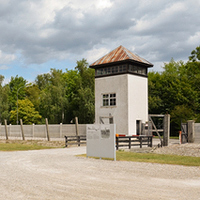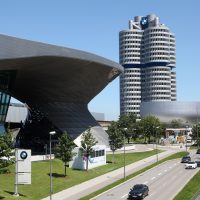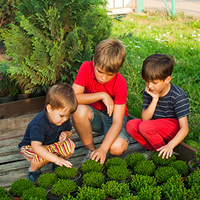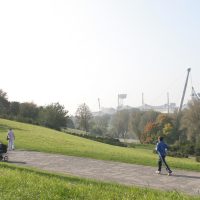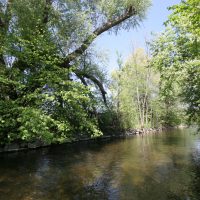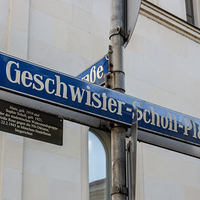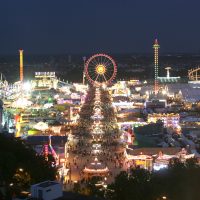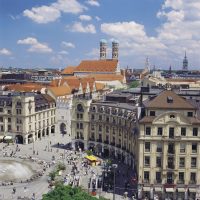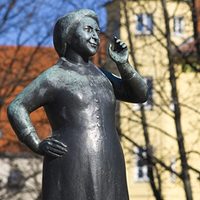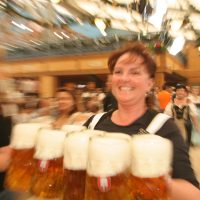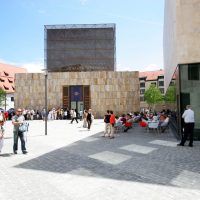A revolution was on its way after five long winters of war. It was on November 8th. 1918 that King Ludwig III. was forced to abdicate under the pressure of the republican politician Kurt Eisner and the leftwing opposition. It was the declared ambition to end the war immediately and to transform the political system into a parliamentarian democracy. Surprisingly all the goals could be achieved without serious resistance and in a peaceful way.
This tour will focus on the history of Munich around 1900, the spirit of the time prior to World War I. and the way it changed due to political and social catastrophes.
Art Nouveau (Jugendstil) is an epoch in art history and is named “Jugendstil” after the illustrated cultural magazine “Die Jugend”, which was founded in Munich in 1896. Renowned artists contributed to Bavaria’s capital city becoming one of the centres of art nouveau. Numerous buildings in the city still bear witness today to this scandalous style which worshipped beauty and radically challenged older traditions.
Show Guides for Language:
Munich’s cityscape today still features numerous impressive examples of Baroque art – castles, churches and palaces. This architectural style, which originated from Italy, was dominant for several decades towards the end of the 17th century. You will be introduced to the Baroque era in architecture, musical history and painting in „Italy’s most northern city”.
Show Guides for Language:
On this very atmospheric cultural history and culinary tour, you can experience Munich at Christmas time, with mulled wine stands and the fragrance of roast almonds in the heart of the city. On a walk through the Christmas market, including the many stands with nativity sets, you will hear poems and stories about the traditional Munich “Christkindlmarkt”.
Show Guides for Language:
Every day hundreds of spectators admire the Glockenspiel at the Munich townhall with the „Schäffler“ (barrel makers) dancing their famous dance. What do you know about the „Schäfflertanz” and its history? Learn more about living traditions and typical customs which create Munich’s very special flair and lend the city its unmistakable character.
Show Guides for Language:
The Cuvilliés Theatre (formerly known as the Residence Theatre) is considered to be Germany’s major Rococo theatre. It is today located in the so-called Apothekenstock (Apothecary Block) of the Munich Residenz and is one of the leading buildings designed by François de Cuvilliés. The theater with its Rococo splendour, where in 1781 the world premiere of Mozart’s Idomeneo was staged, takes you into the world of baroque royal opera.
Show Guides for Language:
Munich as a city of football. The Bavarian capital and football go together, for both professionals and amateurs. This tour is a highlight for all lovers of sports and offers informed answers to everything that a football fan always wanted to know. Look forward to background infos and amusing anecdotes about FC Bayern München and TSV 1860.
Show Guides for Language:
No other district of Munich has so many different faces: Palaces and farmers houses, upscale residential homes and working-class quarters, idyllic village scenery and main roads. The connecting road between the city palace of the royal family in Munich and the summer palace Nymphenburg runs through Neuhausen. This walking tour will take you to the heart of the old village Neuhausen. You will hear stories about famous locals and visit the oldest church (Winthirchurch) as well as the futuristic looking Herz-Jesu-Church. This church is famous for its transparent structure and by now can be found in very many books on modern architecture.
Codes of remembrance. Jews had lived in Munich since the Middle Ages. The rise of National Socialism brought years of defamation, eviction, deportation and extermination. Today, Jewish life has returned to the centre of the city, in the Jewish Cultural Centre, synagogue and Jewish Museum.
Show Guides for Language:
In 1933 the Nazis opened the first concentration camp in Dachau near Munich. More than 40.000 captives lost their lives there. To this day the Dachau concentration camp is an epitome of Nazi terror, inhumanity and unspeakable suffering. The museum and memorial site not only deal with the tragic and horror of this place but also explains how the difficult legacy of the Nazi past has been dealt with since the end of WW II.
Show Guides for Language:
Whether a “village with a million residents”, the “international city with a soul” or a modern metropolis – this tour shows Munich’s contemporary architecture, innovative design and art in public areas. A guide to the city in its progress from the 20th to the 21st century.
Show Guides for Language:
Discovering Munich with a bag full of surprises: A special tour for 6- to 10-year-olds which gets them to know Munich with all senses. Our bag full of surprises and many local stories will help to become familiar with Munich‘s history in an entertaining way.
Show Guides for Language:
Get on your running shoes! You want to discover Munich on the fast lane? Sightrunning?
Follow the tracks of Munich‘s sporty spirit! We show you all parks and green sights in motion.
There is so much to see: You want to enjoy the morning in the English Garden and see the city waking up? You would rather prefer the lanes along the sparkling Isar River in the city center along many famous sights? You want to join the romantic sunset on the Olympic hill in the Olympic Park? What about the historic Nymphenburg Park with its hidden treasures of Bavarian ancestors?
Lets go! We will run and guide you on the nicest tours! An amazing experience!
Show Guides for Language:
Living history during a tour for 10- to 13-year-olds where they can take active part in doing research and a quiz in Munichs old town.
Show Guides for Language:
History from the Middle Ages to the present. There’s not only the River Isar flowing through Munich but also a great number of streams, originally natural branches of the Isar which were canalised later on. The streams played a vital role in Munich’s economic development up until the 19th century – our tour focuses on these major arteries.
Show Guides for Language:
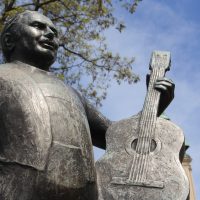
Foto: Reidun Aschenbrenner
It all started with Orlando di Lasso, continued with Mozart and the Cuvilliéstheater, with Richard Wagner and Richard Strauss, and present day’s plans to build a new concert hall are certainly not the final chord in the illustrious musical history of Munich, a music capital which enjoys several operas and top orchestras of international renown.
Show Guides for Language:
This tour addresses the darkest chapter of Munich’s history during the era of National Socialism and the Second World War. It tells of the rise and fall of the „Capital city of the National Socialist Movement” during the dictatorship of Adolf Hitler, the resistance by the “White Rose” Group to which also belonged the siblings Hans and Sophie Scholl, and today’s memorials and monuments, not forgetting those built as a warning to future generations.
Show Guides for Language:
The Oktoberfest beer festival in Munich is one of the largest fairs in the world and meanwhile looks back on 200 years of history. It was first held on 12th October 1810 in a field outside Munich’s city walls to mark the wedding of Crown Prince Ludwig I and Princess Therese. In honour of the bride, the site was called “Theresienwiese” (“Therese’s meadow”), leading to the festival name of “Wiesn” used by locals. Hear its history and entertaining stories associated with the Oktoberfest.
Show Guides for Language:
At the end of the 19th, the area around the Karlsplatz („Stachus“) was residence of successful entrepreneurs as well as artists of the fin du siècle represented by Franz von Lenbach’s artists‘ society „Allotria“. The tour evokes the sophisticated life style of the era of the Prince Regent and introduces Munichs’s rapid development in technology, architecture, culture and society, which all came to a halt with the Great War and the short-lived socialist revolution in 1918/19. The tour also addresses the new trends and changes of the Stachus area since the 1950s.
Show Guides for Language:
The house of Wittelsbach is one of Germany’s oldest aristocratic families and played a decisive role in Munich’s and Bavaria’s history for more than 750 years. Track down the dukes, electors and kings in Munich’s Old City! This historic city walk presents impressive memorials from the worlds of politics, architecture, art and culture.
Show Guides for Language:
Although born in Lübeck, Thomas Mann, winner of the Nobel prize for literature, lived in Munich for more than four decades. On this tour, you can relive the era of the Nobel laureate in Bavaria’s capital, which was then one of the world’s leading cultural metropolises. He commemorated his adopted city in his novella “Gladius dei”, which includes the much-quoted phrase “München leuchtete” – “Munich shone“.
Show Guides for Language:
On this tour, you will meet famous and less well-known women closely associated with the history of Munich‘s past and present – wenches, noble ladies, women with a sense of humour, artists and singers of folk songs, business women and nuns, ladies who are/were saints or just sanctimonious.
Show Guides for Language:
There are several major breweries and countless beer gardens in Munich, and the Oktoberfest is one gigantic homage to the amber nectar. This tour includes qualified beer tastings with detailed information about the history of beer.
Show Guides for Language:
A pilgrim’s route through Munich’s city centre. These circular walks include not only Roman Catholicism and Protestantism but also the Jewish community and the role of the Orthodox Church in Munich.
Show Guides for Language:


